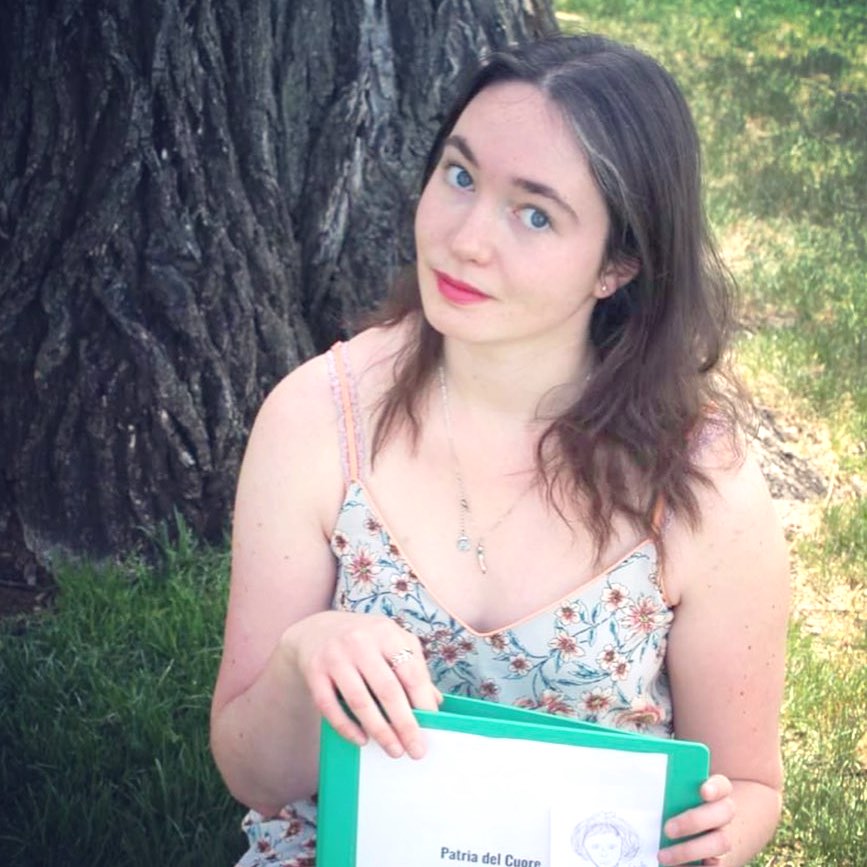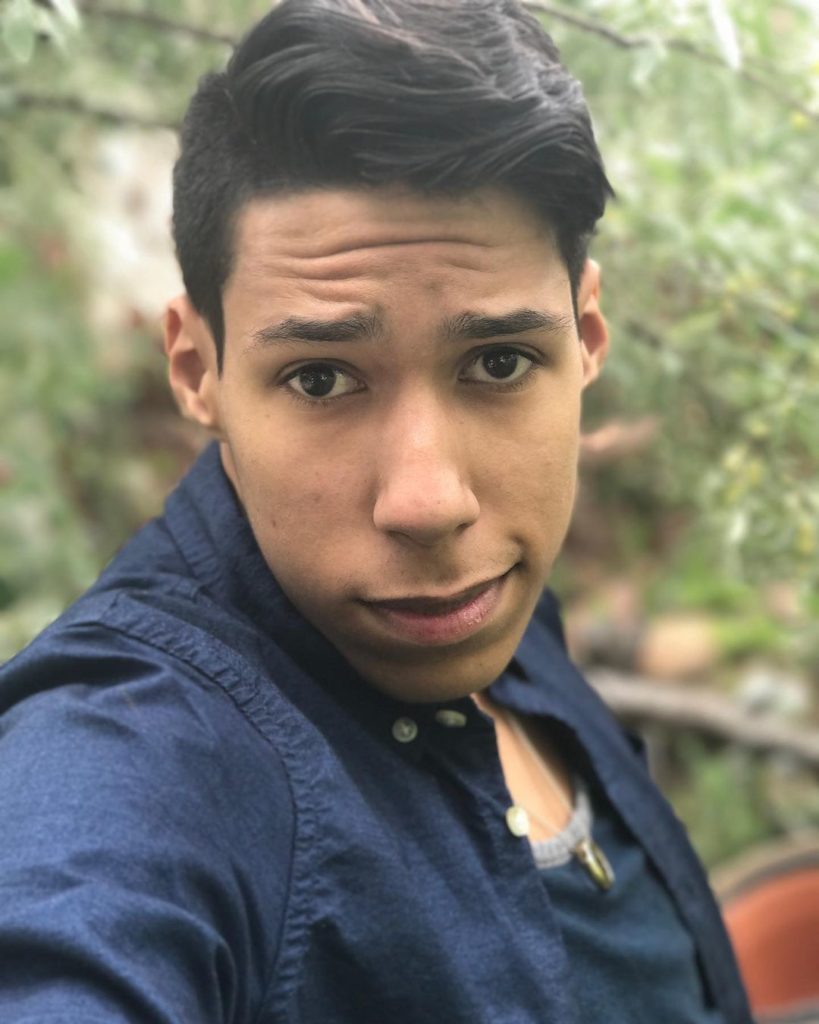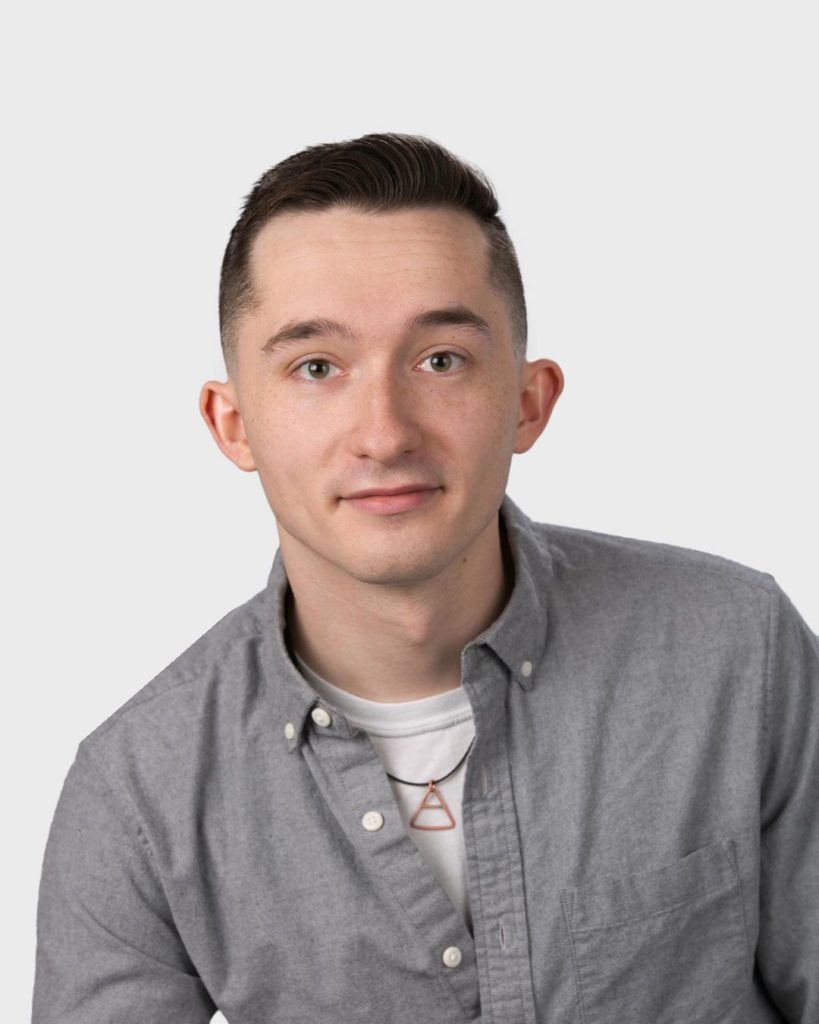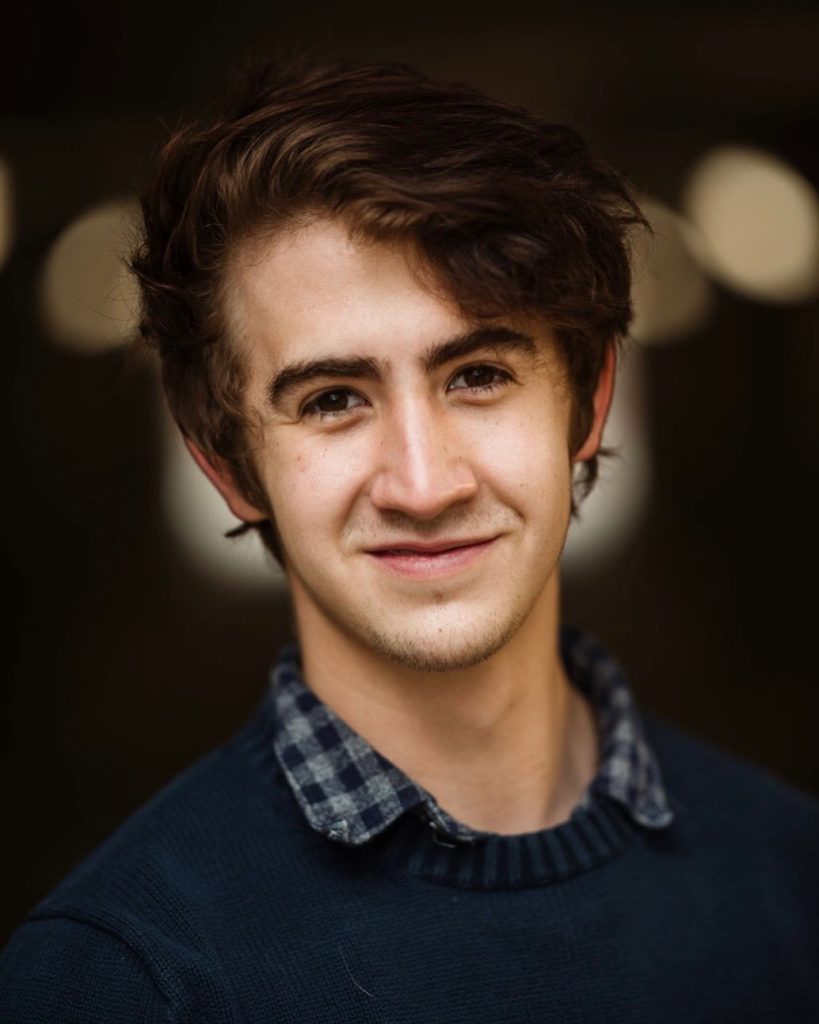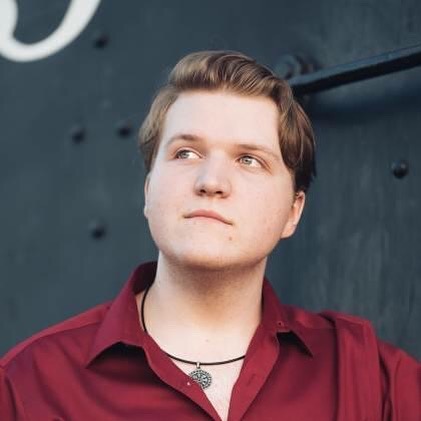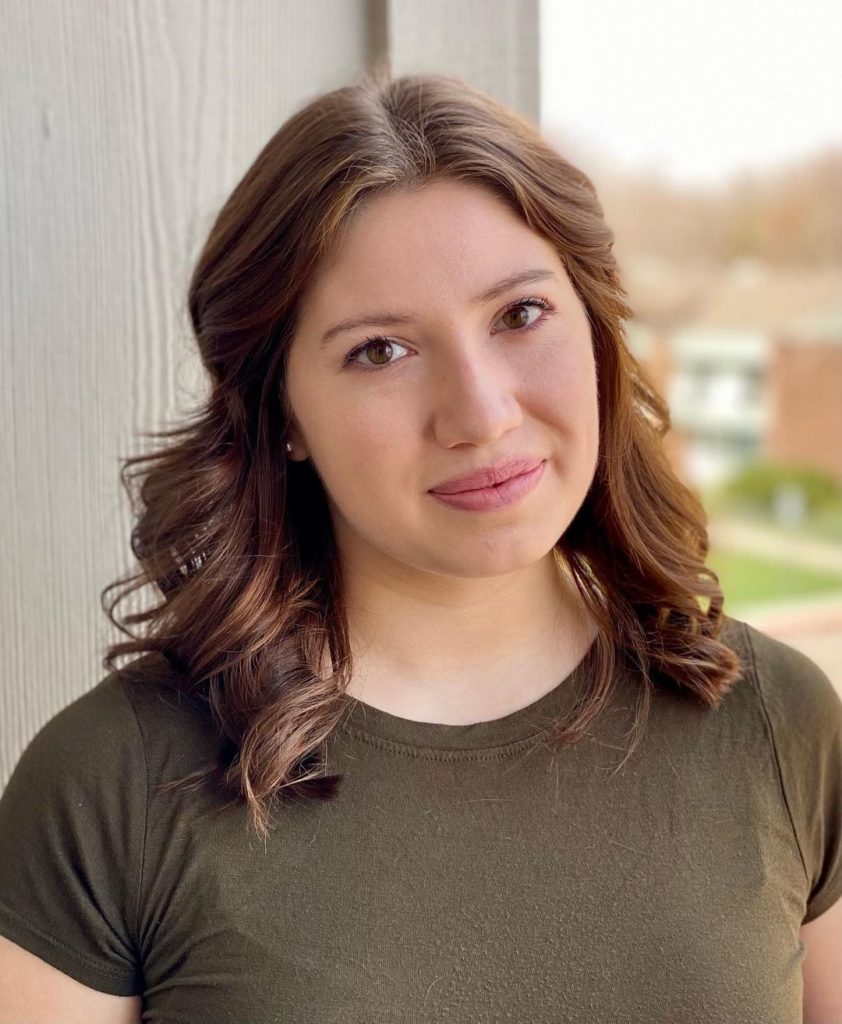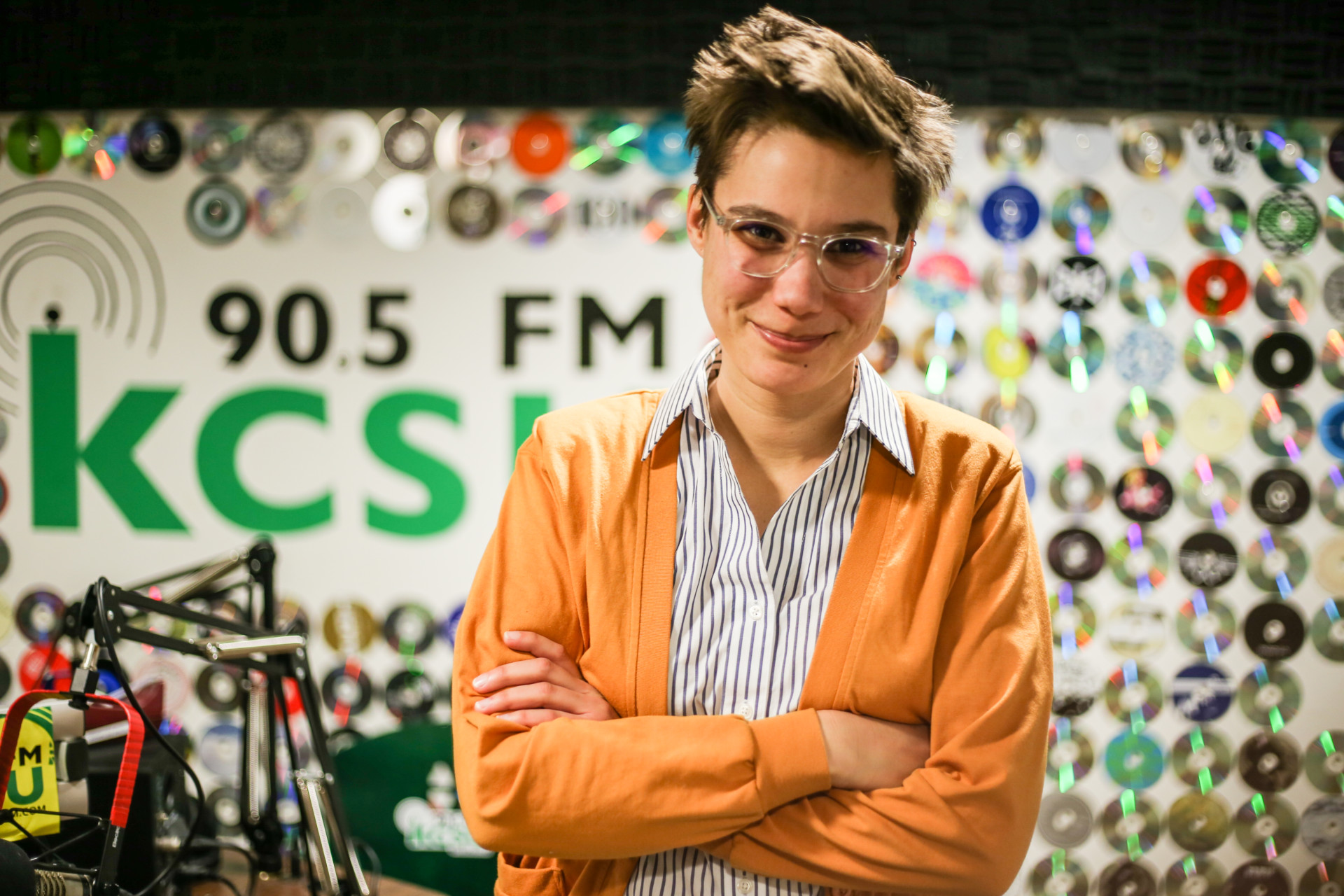
General Manager and instructor Hannah Copeland in the studios of 90.5 FM KCSU in Lory Student Center. Photo by Tony Villalobos May
As the Colorado State University community looks forward to a return to campus after nearly 18 months of remote teaching, learning and working during the COVID-19 pandemic, it’s time to take a moment to absorb some of the lessons learned about how to do things more creatively.
Lab-based research projects and classes dedicated to learning how to use specialized technology faced particular challenges adapting to the pandemic paradigm. Take the audio production course taught by instructor Hannah Copeland, for example.
Students usually learn how to engineer, edit and produce professional audio projects in the CTV studios in the Clark Building or 90.5 KSCU FM on the lower level of the Lory Student Center. With Clark and the LSC shut down after Spring Break 2020, just when students were about to start their final projects, Copeland saw an opportunity: She devised a project that students could complete at home with nothing more than a phone recording app and a digital audio workstation.
The assignment was to tell story about a moment during the pandemic that was meaningful to them in the form of a three- to five-minute podcast using the skills they learned in class.
The Audio Workshop of Colorado State University was born.
Copeland, who is also the general manager at KCSU, completed her own assignment as an example and to test its viability for the already stressed-out remote students. She told the story of when FOMO (Fear Of Missing Out) left her mind for the first time in a decade.
New podcast episodes from that first semester are being released weekly throughout the summer on Spotify. So far, student topics have included memories of pre-COVID parties, what the pandemic meant to a group of Dungeons and Dragons players, and how hot coffee and undisturbed sleep helped one student thrive during lockdown.
“The episodes we’re releasing now are all from Spring 2020, in the heat of the pandemic, right after the pivot to remote teaching,” she explained. “Since we were still remote in the fall and then this spring, I decided to keep the assignment going and will publish the next season of fall podcasts after this semester starts. We’ll probably keep the project going, but move on to non-COVID topics.”
Although it was unexpected, Copeland sees value in teaching students how to use available technology to sound as professional and polished as possible.
“It’s so easy to make and publish audio on the internet from your bedroom,” she said. “Why not learn how to use the technology to sound better than all the other people publishing from their bedrooms?”
The class is about learning to use audio technology, and that was the purpose of the assignment, but Copeland said there were some heartfelt moments that emerged from the stories. The students gave permission to make their podcasts public.
New episodes drop by noon every Wednesday through Aug. 4 on Spotify.
Patria del Cuore
Another example of COVID-induced creativity is Patria del Cuore, an original full-length play produced in 2020 and released on KCSU in three weekly episodes at the beginning of June.
“This is the first scripted and fictional play KCSU has ever produced,” Copeland said. “It’s been such an amazing process.”
Alana Corrigan, the author and director who was then a senior in the School of Music, Theatre, and Dance, had cast her play with CSU students and was in rehearsals for a readers’ theatre production in March 2020. When there was no longer the opportunity to perform it live, she approached Copeland about the possibility of doing it on the radio.
“The actors were all my friends, and I knew how hard they had already worked on it, and I didn’t want to just drop the project,” she said. “When Hannah said she was interested, I told them it would be more work and they wouldn’t get paid, but they all said they wanted to do it. And they were great.”
Corrigan decided not to adapt the script for radio; the nine-scene structure fit neatly into three half-hour episodes.
KCSU distributed five DIY home recording kits to the actors to record their parts individually and remotely, under Corrigan’s direction – a process that took about twice as long as the hour-and-a-half run time of the script.
Once KCSU production director Sam Bonafe used audio software to mix the separate parts on individual tracks, students Cam Warren and Sophie Gentle edited the content by improving the sound quality and adding effects. Copeland estimated about 100 hours of student work went into the production.
Gentle, a senior who had taken Copeland’s audio production class, started her final edit in January 2021, when she was able to spend time in the KCSU studio with the professional equipment.
‘Like actually watching a play’
“I actually spent a lot of time on the sound effects and music,” she said. “I wanted the podcast to sound like you were actually watching a play, so I spent a lot of time finding the right sound effects. Overall, it was a bit hard trying to put together all the voices and line everything up and get the timing perfect, but at the end, I think it turned out great.”
Working remotely, Gentle, who graduated in May, said she never actually met Corrigan in person, but they talked and emailed to make sure they had a shared vision for the final product.
The story dives into the dynamics of the Fanucci family who live on Piccolo Cuoro, a beautiful Italian island. Teenager Valentino (played by Ryan Leibold) is disowned by his father (played by James Fagan) for coming out as gay, and moves to the mainland Sergio, a middle-aged and single-vineyard owner (played by Ryan Wilke-Braun), steps in to raise the boy. As Sergio learns to become a fatherly figure for Valentino, he also develops feelings for his long-term business partner, Nico Silvestri (played by Adam Isaacs).
“I never thought it would take over a year to get on the air, but releasing it now is the perfect way to celebrate Pride Month,” Copeland said. The episodes rolled out every Tuesday during the first three weeks of June.
Corrigan, who is now in graduate school at the University of Massachusetts in Boston, said one of the greatest bits of feedback on the production came from a friend living far from Fort Collins.
“She texted me after the second episode: ‘I can’t wait to hear what happens next!’”
Listeners don’t have to wait – all three episodes are now streaming on kcsufm.com.
Copeland hopes more collaborations between KSCU and student playwrights and actors can develop in the post-pandemic world.
“We’re jumping into a whole new segment of the podcast world now,” she said.
